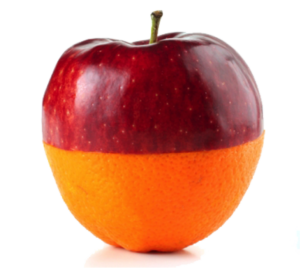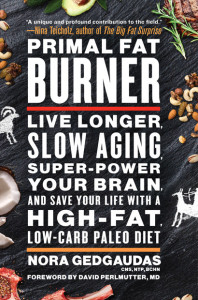
I was recently contacted by someone through Facebook who wanted to know how the idea of being ‘ketogenic’ differs from that of ‘paleo’. The (somewhat loaded) question actually prompted me to write this article. I realized it was important to better delve into not only these two definitions, but also how they each are defined within my own, unique approach to diet and health that “hybridizes”, if you will, certain aspects of these genres.
I find myself frequently saying that if there was any one word I could strike from the identifiers of “the paleo diet” or “the ketogenic diet” —or “the Primal diet”, for that matter, it would be the word “THE”. After many years now of mingling in the paleosphere and following the work of multiple ketogenic experts and innumerable adherents of these two dietary approaches, I can tell you that there are almost as many approaches to these generic “diets” as there are persons claiming to practice them.
First, the Paleo-thing
The most general concept of “paleo” eating is predicated on the idea that we should be basing our diet on those pre-agricultural foods that would have been most readily available to our primitive ancestors. It technically avoids (in the purest sense) most all sources of highly processed foods, grains and legumes and most dairy products.
But as with most things, there are a huge number of variations and deviations from this core concept. Butter, cream and cheeses are commonly included in many of the more popularized ‘paleo’ approaches. Some also even insist upon promoting the consumption of other post-agricultural foods such as non-gluten-containing grains, rice, legumes and starchy potatoes (none of which is really defensible from a Paleo standpoint at all). One newer book claiming a paleo friendly approach actually somehow insists that we were grain eaters before we ever became hunters and that we need to go back to eating them again. I wish I were kidding (I’ll save the rant I have about that for another time).
There are some purists within the paleo genre who adhere to strictly wild or foraged foods; and still others are into eating only raw food (animal and plant). Some promote the consumption of strictly lean meat (the less animal fat, the better for them in their minds) and they recommend/eat a mostly high protein diet. Others even avoid plant-based foods altogether. Some ‘paleophiles’ are low carb in their approach and others—perhaps even a popular majority–are relatively higher carb (rationalizing that “natural” sources of sugar and starch are somehow superior and not metabolically damaging). Most paleo folk do seem to be mindful of food quality (exclusively grass-fed meats, organic veggies, etc) but there are those that simply obtain their meat and veggies from “wherever”—assuming it’s all pretty much the same. A few might merely look for the “paleo friendly” stamp on the package labels to make their choices at the grocery store, entrusting the definition of “food quality” to those that manufacture them. Still others drink fruit smoothies, eat store-bought yogurt, whey protein powders, peanut butter, and/or lots of fairly refined “gluten-free” or “carb substitute” foods like pancake mixes, granola, pastas and cellophane-wrapped snack bars with cavemen on the label…and then wash it all down with coffee and butter with coconut ice cream for dessert. OH—and tequila. Dr. Oz actually once even attempted to present a diet of tofu, fruits and vegetables as somehow “paleo” (yeah…I can roll over and die now).
The fact is, this genre is all over the map! There is not a lot of consensus and getting those within the genre to move in the same (or even the same general) direction toward or away from anything is a lot like, well, herding cats.
I would say that by and large, however, the over-arching rule of thumb is “as long as it would’ve looked like food to someone wandering around with a loincloth and a spear once upon a time we can automatically think of it is healthy food for us now.” This often includes starchy roots and tubers, juices, honey, maple syrup… etc (which clearly do not support a ketogenic/fat-burning metabolism). The assumption is that as long as a food seems “natural” and “whole” was somehow all equally healthy for our ancestors and therefore is automatically healthy for us.
Also, by in large, meat tends to be greatly overrepresented in the more popular versions of the paleo diet.
On the plus side, “nose-to-tail” inclusion of organ meats and other nutrient dense tissues (such as bone marrow, etc) is widely promoted. And for those that actually follow through and include them in their meals (at least from time to time), this is decidedly a very good thing.
Even though the term “Paleolithic” by definition technically suggests a prehistoric time period spanning 2.6 million years ago to roughly 10,000 years ago, prior to the end of the last Ice Age, most modern-day popularized Paleo diets also include quite a number of post-Paleolithic, Holocene period foods that would simply not have been available at all prior to the last 10,000 years of our most current, unusually temperate climatic warming period. Is that all bad? It depends.
That said, as I mentioned earlier, food quality does tend to be an important consideration within the modern day paleo movement (i.e. meats typically obtained from exclusively grass-fed animals, and plant foods from organic or wild-foraged sources). So on the whole, your most “basic” Paleo approach will tend to put the average person ahead of the curve, as compared to the standard American diet with respect to its health-promoting qualities. But so much depends upon how any given person’s approach to this way of eating is ultimately defined. That’s where the rubber really hits the road.
So what about the Ketogenic-thing?
A ketogenic diet by definition is based on the idea of getting the majority of one’s calories from fats/oils while greatly limiting utilizable carbohydrate intake. Some quasi approaches, like the Atkins diet refer to themselves as “ketogenic”, simply because they contain very low carbohydrates— but protein tends to be overrepresented on the menu (not unlike most approaches to paleo). This is a decided compromise to healthy, efficient ketogenic adaptation (among other problems, which I discuss at length in my books).
Food quality is of little “official” consideration, typically, and the focus lies mainly on macronutrient ratios, ignoring most everything else. Feedlot/ factory farmed meat, highly processed meat, refined vegetable oils and conventional (i.e. heavily pesticided, GMO-derived/fed and grown in nutrient depleted soils) fibrous vegetables and greens are all fair game for the menu.
With the growing popularity of ketogenic, “eat fat to burn fat”, dietary approaches there is also, as with paleo, a growing commercialism and co-opting of this approach by Industry. I see it as a potentially catastrophic, albeit not an unexpected trend. And while controversy thrives in the blogosphere when it comes to various myths and lore being foisted upon anything, along with potential “dangers” of a fat-based/low carb approach, little consideration is given to clearly defining what is being discussed. Generalizations abound.
The following includes some cursory examples of the variety of possible ketogenic approaches:
- Starvation (guaranteed to kick up those ketones)
- Fasting or “intermittent fasting” (sometimes ketones)
- Diabetic ketoacidosis (not what anyone is shooting for)
- Caloric restriction (fewer calories across the board) and the generation of a mild ketogenic state in response to that, along with rampant potential for nutrient deficiencies).
- CRON (caloric restriction with optimal nutrition—quite a bit more focused upon nutrient density. We’re getting warmer.)
- Medically formulated (read: dry feedlot hamburger patties on lettuce), or pre-prepared medical ketogenic “foods”/food-like substances (involving canned beverages containing partially hydrogenated vegetable oils, high fructose corn syrup, milk solids, soy, whey protein, synthetic vitamins and inorganic minerals, complete with artificial flavors. Yummy. No wonder conventional doctors typically describe ketogenic diets as unpalatable and difficult to sustain. And no wonder certain detractors refer to prolonged ketosis as “dangerous.” I’d consider approaches like this “dangerous” for any length of time.
- Atkins-type diets (high in animal protein from any old source –processed and unprocessed/feedlot-fed/factory farmed meats—plus “whatever” fats, frequently also include refined vegetable oils and highly processed carbohydrate “substitutes.” (expect mild and less than fully effective ketosis and marginal health, at best long term). High protein diets, in and of themselves, actually do a pretty poor job of generating and sustaining healthy and fully effective ketosis.
- Then you have your high fat, AND high protein, low carb/no carb approaches—including no vegetables (well, the Inuit and Masai men did it…but that doesn’t mean we all have to, or should.)
- Higher fat, lower protein, veggies and certain (so-called) “safe starches” allowed. Ummm…yeah…NO. I personally see the term “safe starches” as pretty much an oxymoron. You can read about why in my books.
- MCT oil and high-tech, synthetic ketone powders added to a regular SAD (standard American diet) or Paleo diet (washed down with lots of coffee)
- High fat from dairy products, and various vegetable oils (refined or unrefined).
- A few might even try to limit fat sources to strictly plant-based oils, and avocados/olives/nuts (like vegan or other animal fat-phobic ketogenic approaches).
In effect, regardless, the primary emphasis in ketogenic approaches are defined simply on whether you are theoretically burning fat as opposed to sugar for fuel. The approach within this exclusive context—at least by pure definition– tends to be overwhelmingly shortsighted, in my view. And not all ketogenic approaches are going to be equally healthy. But the basic premise of adopting a fat-based versus sugar-based metabolism IS (at least as a base aspiration) scientifically sound and well supported in the literature as a means of acquiring better metabolic health.
So where do I stand with my own recommendations amidst this quagmire of confusing differences…and why?
The thing to keep in mind with respect to the paleo ideology is that our prehistoric ancestors weren’t necessarily making their dietary selections based upon a desire to maximize their health or eventual longevity. Sometimes they were limited to whatever the heck they could find. They even frequently dined upon insects and grubs (also pretty high in legitimate fat and protein, for the most part, but other than “cricket flour cookies” aren’t likely to be included on the modern paleophile menu). And let’s face it, somewhere along the way some misguided paleolithic humans also figured out that they could take wild grass seeds (i.e., grains), mash them into some kind of porridge and eat that, too. And hey– once they figured out they could actually ferment that stuff into beer the die was cast (basically, it heralded the beginning of the end in terms of our collective health).
We DO know from stable isotopic research into the composition of ancient human bone collagen throughout innumerable periods of our evolutionary history that we DID exhibit a decided and consistent preference for the fatty meat of very large herbivores wherever possible. This was true even in places like the Mediterranean regions where seafood would have been readily available. So there are some worthwhile consistencies to consider here. We are decidedly a species well designed to consume significant amounts of animal source foods, which contain unique nutrient profiles we also require for our optimal health.
In my view, the most basic premise of “paleo”—the idea that whatever we would have most consistently eaten as a species throughout our long evolutionary history would have also helped shape our basic physiological makeup and most important nutritional requirements. To me this is the only rational starting place with respect to what it might take to figure out what an optimal diet for us humans might be today.
But to me it is also merely that: a starting place.
In a nutshell, my “Paleo/Ketogenic” (“Primalgenic®”?) approach looks like this:
Smaller, adequate amounts of 100% grass-fed/fattier meat, including organ meats and other tissues (i.e., bone marrow, etc), some uncontaminated, wild-caught seafood, eggs (if they are well tolerated), a variety of fibrous vegetables and greens, nuts and a few seeds (again, if they are well tolerated); plus probiotic-rich, homemade cultured/fermented foods and some bone broth.
This all amounts to being: Higher fat (or rather, higher % fat), moderate in protein, low in utilizable carb (sugars/starches), and higher fiber.
My personal approach to eating optimally well combines both a basic ‘paleo’ approach while also simultaneously embracing a fat-based metabolism. In my newest book, Primal Fat Burner I make an exhaustive and convincing case as to exactly why I have chosen this particular approach. The “Paleo” part of my focus is an unwavering emphasis upon food quality— while simultaneously not assuming that just because our ancestors would have put something in their mouths and not dropped dead; or just because a food isn’t processed or grown/raised using industrial methods that everything seemingly “natural” is somehow equally good for us.
It isn’t, and there really is no rational basis for that assumption.
It’s not all just about eating “real food”. Call me politically incorrect. There is simply more to it than that. Especially in modern times where we are more compromised than healthfully supported by our environment. I make a special point, in fact, of taking this into account. We are no longer living in the pristine environment of our ancestors.
My own approach to diet and health also relies quite a bit on human longevity science, which in essence tells us to avoid most anything that is likely to trigger an insulin response (i.e., sugars and starches—including honey, maple syrup, fruits and root vegetables/starchy potatoes fit that bill); and to limit our actual protein intake to that which meets but does not exceed our daily requirements. So what I advocate for is anything but a high-protein diet.
My version of things also avoids nearly all dairy products, due largely to their high risk for antigenicity and other considerations. I also rather uniquely take the rapidly growing phenomenon of autoimmunity into account, passionately bringing a fairly sophisticated consideration to this undeniably important but frequently underappreciated and misunderstood issue.
In my particular corner of the ketogenic-friendly paleosphere, dietary fat— including particularly the fat of healthfully and naturally grass-/green forage-fed animals forms more of the caloric basis of the diet, while the included plant foods come from fibrous/non-starchy, organically grown sources. This combination effectively cultivates a healthy ketogenic metabolism— which in fact would have likely predominated in our prehistoric ancestors more often than not, and for which I make the case as our most natural and intended state of being (as evidenced by the overwhelming array of benefits and overwhelming lack of downsides, among other things). In my version of healthy eating, there is also a strong emphasis on particular fat-soluble nutrients (from animal source foods), which tend to be overlooked in their critical importance by those simply stuck on the idea of “macronutrient ratios”. In other words, what I talk about goes well beyond basic popularized Paleo, and well beyond a superficial focus on macronutrient ratios characterized by many ketogenic diets…all with an unwavering emphasis upon food quality. This is why the subtitle of my first book, Primal Body, Primal Mind reads: “Beyond the Paleo Diet for Total Health and a Longer Life.”
OH–and as for the “Primal” thing–I chose this term way back in the year 2000, when I wrote the earliest version of my manuscript for my first book, Primal Body, Primal Mind. I used the term “Primal” as a way of trying to distinguish my approach from other “paleo diet” approaches that were mainly based on more modern day (i.e., within the last few thousand years), primitive tribal dietary characteristics.
To me the term “Primal” harkened back to something much older and (to me) more foundational in its implications; also taking a very different climatologic time period into account. But by no means is this use of the term “Primal” consistent among others that have adopted it to describe their own material. I’ll leave those folks to define their use of the term for themselves.
So those are the differences, in a nutshell.
In the end, when discussing the relative merits of the various dietary approaches we are inclined to embrace, it becomes extremely important to carefully define what we are talking about and not simply rely on overly generalizing labels that tend to be somewhat meaningless, when push comes to shove.
~ Nora Gedgaudas, CNS, NTP, BCHN
Find out how to restore your Primal Birthright with the Primal Restoration® Certification Course!




Excellent, Nora! Great descriptions with substantive facts.
Thank you!
T. Jenkins
I am so glad that I have found you as a source for health information. Keep up the good work of sharing your knowledge.
Thank you!
Excellent, very well clarified for me.
Thank you
Wonderful article, Nora…I’m sharing this one. I started on Paleo 8 years ago – ditched the wheat, as they say, plus dairy but I gained weight eating too much protein and yeah like I can eat one banana – not going to happen. Found you about 6 years ago and devoured, “Primal Body, Primal Mind” – it’s still my primer and this article just adds to the mix and further clears the confusion between Paleo and Keto eating. Good luck to all of us trying to figure this s%*& out! Thanks for all you do, dear Nora…love from Vermont.
Lynda
Question
My son Patrick is 43 and has C P
He is in a a Va Beach ,Va facility now and they
feed him SO MUCH carbs
I heard Dr Eric Westman comment that
reducing carbs in epilepsy patients
can reduce and even eliminate
seizures ; will this work for Patrick ?
Dear Ernest,
Westman is right about that. Although I can’t offer you medical advice, I know that if it were me I would be totally exploring a very low carb, fat-based ketogenic approach. Even in conventional medicine, neurologists consider this a first line of treatment. Please check out my book, Primal Fat Burner and you can also Google “ketogenic approaches to treating seizures”. TONS of research supporting this!
Finally, you may also want to look into Neurofeedback for your son. Go to EEGinfo.com for more info and eegdirectory.com to find a qualified practitioner near you. The combination of both approaches is quite powerful!
Warmly,
~Nora
I love this article! I lean more toward Keto and am happy the consciousness is awakening to the importance of organic and grass-fed foods. Clean and natural, just like I want my healthy body to be! Thank you for your tireless effort around education.
Hi Nora,
I have all your books and, as a nutritionist and board certified holistic health practitioner, am pretty much in agreement with your stance on optimal nutrition. Just curious, though, if you are familiar with the work of Paul Jaminet, Ph.D, author of Perfect Health Diet. He maintains that an insulin response isn’t all bad and that, indeed, starchy carb intake of up to 200 mgs. a day in the form of sweet potatoes, potatoes, white rice, etc. is needed in order to optimize both immunity and the body’s ability to convert T4 to T3. It’s also widely reported in the “thyroid disorders” community that starchy carbs are required for optimal thyroid function. Then, of course, there’s the whole area of the benefits of resistant starch in feeding beneficial gut bacteria. Personally, I found that when my diet leaned towards ketogenic, organic acids testing showed markedly increased yeast metabolites in my urine (since yeast can feed on ketones). Interested in your thoughts on this. Thanks!
oops. made an error in my earlier comment. i meant to say to 200 grams, not mgs, of carbs!
I’ve read your works and keep trying to apply the principles you describe – not easy, especially since moving into a “retirement community” where the food is prepared using heaven-knows-what as sources! One question that troubles me however is: how do we adjust for the profound life-style changes that have occurred in the last couple centuries…such as central heating/cooling, year-round availability of “seasonal” foods, protective clothing… to name a few. Surely these considerations will affect our nutrient needs. Would love to hear your thoughts on adaption of our original/primal needs to modern, less demanding circumstances. If you’ve discussed this in one of your publications, I will happily refer to whatever source you recommend.
I am very familiar with Paul Jaminet’s theories. After carefully considering and examining them I have personally found them to be lacking. I addressed this very topic in the first online Paleo Summit hosted by Sean Croxton and Underground Wellness. I sincerely recommend you give it a listen sometime. Even Paul Jaminet himself contacted me to congratulate me on an that excellent presentation. In it I address the whole thyroid question, so-called “safe starches” (not!) and other related topics. Paul is a smart guy but neither him nor his wife are trained as healthcare experts or providers. I have 20-years of direct clinical experience as a health care provider seeing first-hand what works and what doesn’t. And I’ve been researching health/nutrition for over 35-years.
The fact remains that there is absolutely ZERO scientifically established human dietary requirement for carbohydrates of any kind, much less sugar or starch. None. Therefore they simply cannot be “required” for thyroid function or anything else. In fact, I am literally the ONLY woman in my entire family not having a thyroid disorder!
Also, if you go to http://www.PrimalFatBurner.com you can download a free PDF I created on “7 Myths of Ketosis” —basically addressing many of the popular misconceptions and disinformation concerning ketosis. I also urge you to read Primal Fat Burner, which is loaded with clarifying details pointing to details as to why a being a fat-burner is the best and most natural human state of metabolism and health.
I hope this helps!
Warmly,
~Nora
Dear Penny,
Part of the premise of my particular dietary approach takes these very factors that concern you into account. We are no longer living in the world of our prehistoric ancestors, much less our great-grandparents, our grandparents or even our parents, for that matter. Any dietary approach designed to optimize health absolutely has to take our modern world— which is far more hostile than anything experienced by our prehistoric ancestors, in my view— into deep consideration.
Both my books, Primal Body, Primal Mind and Primal Fat Burner are truly focused on these objectives. If you are interested in an even more detailed understanding of foundational health and one that can even better arm you to address the many confusing health claims and issues we all face, then I would like to interest you in my ongoing weekly educational series, Primal Restoration™. You can go to http://www.primalrestoration.com to learn more about it. It is in many ways slated to be the repository of my life’s best work.
I hope this helps!
Warmly,
~Nora
hi Nore
Ann Michael here from Patagonia Chile
I loved your message.. btw do you or do you not drink bullet coffee?
At 61 years I have just started drinking coffee but only as “bullet” coffee..
I love the kick and it really seems to keep my blood sugar at an even level until lunch.. I do eat breakfast with bone broth .vege a meat and fat as well.
Great article. I am so grateful to have found your work. Nora, can ketogenic diets help with rheumatoid arthritis. Is there any evidence of this. What about other autoimmune problems and ketosis? I have vitiligo, Raynaud’s and now the early signs of RA…. all are on the autoimmune side of things. Blessings to you Nora and your great work.
I try to take it to the basic definition – ketogenic refers to a diet in which part of the goal is to burn ketones as fuel as opposed to glucose. Serious advocates regularly test their blood for ketones and glucose levels, as well as promote only natural grass fed products, and the avoidance of unhealthful oils. There are many unhealthful paleo and keto promoters in the diet world; To pit the diets as one vs the other in my mind is not the question, but rather what is the goal? Most are concerned about weight loss as opposed to nutrition, while I would argue a correct diet is dependent on where the dieter is in life, their goals and health issues – some people can eat sweet potatoes a couple times a week, some people are older and combating insulin resistance might be better off with kale instead. In the end, it depends on where the dieter is and has been ; I also don’t care to refer it to diet but a lifestyle.
I am just introducing your diet to my doctor. My question to you. Can I have black coffee on your diet?
Dear Lillian,
First off, I want to thank you for your kind remarks on my Facebook page. I noticed them but did not have time to respond.
As for black coffee, I am not categorically opposed to all coffee, and how coffee is going to affect the given person depends on who they are and why they drink it. The quality of the coffee also matters quite a bit.
IF the coffee you drink is 100% organically grown and all you are doing is drinking a cup or two a day, it’s probably okay. But if you are one of those people that feels like you can’t function normally until you’ve had that morning cup of coffee, then I encourage you to look a bit more closely at that and why you need coffee to compensate for a lack of energy. I also don’t like to see people drink too much coffee if they have age-related cognitive impairment, since the caffeine tends to cannibalize your acetylcholine levels. Some people are cognitively helped a little bit by coffee and others can end up compromised by it. As with so many things in life, “it depends”.
Also, the organic thing is really important. Coffee is one of the most pesticided crops there is. I know that Bulletproof coffee brand also goes the extra mile to make sure that there is zero mold contamination or mycotoxin residue, which can have devastating effects on those persons that may unknowingly have mycotoxin (immune) sensitivity.
Good luck with your medical doctor. If they are very conventional in their thinking they probably won’t be too excited about supporting you in this dietary change. That said, there are growing numbers of medical doctors throughout the world that take the time to review the science and have come to recognize the extremely broad range of benefits associated with the dietary approach I promote. Neurologists have been some of my biggest fans (including Dr. David Perlmutter, who wrote the foreword for my book). My own approach hybridizes “paleo” (a.k.a., ancestrally aligned) dietary principles with a low-carb, ketogenic approach. I also take into account principles in human longevity research, as well as considering the world we live in today. I recently elected to trademark the term, ‘Primalgenic’ to more accurately distinguish my approach from some of the more commercialized and otherwise stigmatized aspects of these genres. In any case, I hope things go well with your doctor. If not, there are plenty of others that would likely be more than willing to support you.
I will look forward to hearing any updates you are willing to share along the way.
Warmest regards,
~Nora
Thanks for your great work! We just got your Rethinking Fatigue book and I am looking forward to applying its wisdom to helping correct my husband’s chronic fatigue.
We began a ketogenic journey about 4 months ago and we have each lost 30 pounds of FAT and have greatly improved our blood pressure readings and serum markers already.
Chalk up 2 new fans from deep in the Navajo Reservation in remote Northeastern Arizona!
Dear Sandra—
Thanks so much for your wonderful comments! They really mean a great deal to me. Any chance I could quote you?
Warmest regards,
~Nora
Dear Nora –
Please feel free to quote me! Thank you for asking.
Sandra